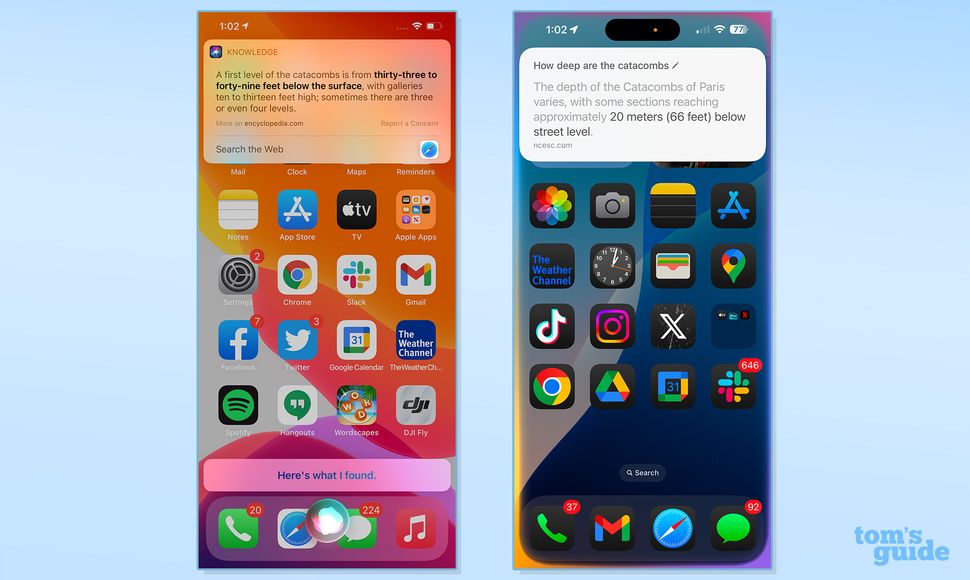Can Apple Revitalize Siri With Large Language Models?

Table of Contents
The Current Limitations of Siri
Siri, despite its integration into billions of Apple devices, suffers from several key limitations. Its natural language understanding often falls short, leading to frustrating inaccuracies and misinterpretations. This impacts its ability to handle complex tasks effectively. The user experience is often inconsistent, with responses varying wildly in accuracy and helpfulness.
- Struggles with nuanced commands and contextual understanding: Siri frequently struggles to understand commands with subtle nuances or those reliant on prior context. A simple request might require multiple attempts before it’s correctly understood.
- Lacks the ability to engage in complex conversations or multi-turn dialogues: Unlike more advanced virtual assistants, Siri often fails to maintain context over multiple turns of a conversation, leading to repetitive and unhelpful interactions.
- Integration with third-party apps is often clunky and unreliable: Connecting Siri with third-party apps remains a challenge, resulting in a fragmented user experience and unreliable performance.
- Inferior performance compared to competitors in tasks like information retrieval and task completion: In head-to-head comparisons, Siri frequently underperforms in tasks such as retrieving complex information or completing multi-step instructions. This directly impacts user satisfaction and highlights the need for improvement. These Siri limitations underscore the need for a significant technological leap.
The Potential of LLMs for Siri
Large language models (LLMs) offer a powerful solution to many of Siri's shortcomings. Their advanced natural language processing (NLP) capabilities could dramatically improve Siri's ability to understand and respond to user requests. This potential extends to enhanced contextual awareness and the generation of more sophisticated, nuanced responses.
- LLMs can enable more natural and fluid conversations: LLMs allow for a more conversational, less robotic interaction. Siri could engage in meaningful back-and-forth dialogues, understanding and responding appropriately to the nuances of human language.
- Improved understanding of user intent and context leads to more accurate responses: By processing the context of a conversation, LLMs allow Siri to anticipate user needs and provide more accurate and relevant answers.
- Ability to handle complex requests and multi-step instructions: The sophisticated reasoning capabilities of LLMs enable Siri to manage complex tasks involving multiple steps or conditional logic.
- Enhanced ability to learn and adapt to individual user preferences: LLMs can personalize Siri’s responses based on individual user behavior and preferences, making it a truly personalized virtual assistant. This personalized experience is key to user engagement and satisfaction.
Specific LLM Applications for Siri
The benefits of LLMs extend beyond simple improvements. Integrating them into Siri could unlock entirely new capabilities and significantly enhance existing features.
- LLMs can power a more intelligent search within iOS and macOS: Siri could leverage LLMs to provide more insightful and relevant search results, understanding the user’s intent beyond simple keywords.
- Siri can engage in more natural and engaging conversations, feeling less robotic: This would transform Siri from a purely functional tool to a more helpful and engaging companion.
- Proactive assistance features based on learned user behavior and context: LLMs could enable Siri to anticipate user needs and proactively offer assistance, streamlining daily tasks and enhancing productivity. This proactive assistance is a hallmark of advanced virtual assistants.
Challenges and Considerations for Apple
While the potential benefits are significant, Apple faces considerable challenges in integrating LLMs into Siri. These challenges require careful planning and execution to ensure a successful implementation.
- Balancing the need for powerful LLMs with user privacy concerns: LLMs require vast amounts of data for training, raising significant privacy concerns. Apple must find a way to leverage the power of LLMs while maintaining its commitment to user data privacy.
- The computational demands of running sophisticated LLMs on devices: Running complex LLMs on mobile devices requires significant computational power and energy, potentially impacting battery life. Optimization and efficient model deployment are crucial.
- Maintaining Apple's focus on a seamless and intuitive user experience: Integrating LLMs must not compromise Apple's reputation for user-friendly interfaces and intuitive design. The new features should enhance, not detract from, the user experience.
- Potential for increased energy consumption on devices: The increased computational demands of LLMs could lead to higher energy consumption on devices, potentially reducing battery life. Apple needs to find ways to mitigate this impact.
Conclusion
Large language models offer a significant opportunity for Apple to revitalize Siri and finally close the gap with its competitors. The potential benefits in terms of improved natural language understanding, conversational abilities, and proactive assistance are substantial. While challenges related to privacy, computational resources, and maintaining the user experience exist, the potential rewards of a truly intelligent and helpful Siri are too great to ignore. The future of Siri might depend on its successful integration with LLMs. Let's see if Apple can leverage this powerful technology to transform its virtual assistant and create a truly intelligent and helpful companion.

Featured Posts
-
 Uk Taxpayers Over 23 000 Understanding Hmrc Correspondence
May 20, 2025
Uk Taxpayers Over 23 000 Understanding Hmrc Correspondence
May 20, 2025 -
 Sconto Hercule Poirot Ps 5 Meno Di 10 E Su Amazon
May 20, 2025
Sconto Hercule Poirot Ps 5 Meno Di 10 E Su Amazon
May 20, 2025 -
 Us Typhon Missile System In Philippines A Counter To Chinese Aggression
May 20, 2025
Us Typhon Missile System In Philippines A Counter To Chinese Aggression
May 20, 2025 -
 Cote D Ivoire Analyse Approfondie Du Projet Du 4eme Pont D Abidjan Delais Budget Et Financement
May 20, 2025
Cote D Ivoire Analyse Approfondie Du Projet Du 4eme Pont D Abidjan Delais Budget Et Financement
May 20, 2025 -
 Restrictions Des 2 Et 3 Roues Sur Le Boulevard Fhb Debut Le 15 Avril
May 20, 2025
Restrictions Des 2 Et 3 Roues Sur Le Boulevard Fhb Debut Le 15 Avril
May 20, 2025
Latest Posts
-
 Retired Four Star Admirals Corruption Conviction Details And Impact
May 20, 2025
Retired Four Star Admirals Corruption Conviction Details And Impact
May 20, 2025 -
 Retired 4 Star Admiral Found Guilty Details Of The Four Bribery Charges
May 20, 2025
Retired 4 Star Admiral Found Guilty Details Of The Four Bribery Charges
May 20, 2025 -
 Admirals Bribery Trial Guilty Verdict On Four Counts
May 20, 2025
Admirals Bribery Trial Guilty Verdict On Four Counts
May 20, 2025 -
 Four Bribery Charges Against Retired 4 Star Admiral Result In Guilty Verdict
May 20, 2025
Four Bribery Charges Against Retired 4 Star Admiral Result In Guilty Verdict
May 20, 2025 -
 High Ranking Admiral Found Guilty A Corruption Scandals Impact
May 20, 2025
High Ranking Admiral Found Guilty A Corruption Scandals Impact
May 20, 2025
